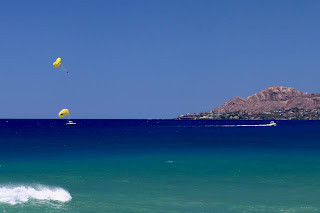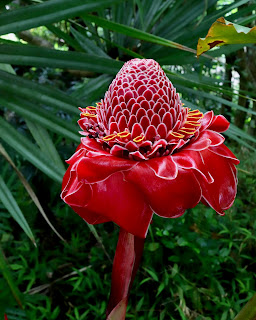Dear Readers, due to a family health situation, we have had to cancel our trip to Australia this year. I'm happy to report that the situation is improving but any travel we do in 2020 will need to be closer to home. As a result, there will be no Down Under Blog to share with you this year. We plan to return to Australia in January 2021 and I will keep you posted on when blog entries will begin again.
Wishing you all a happy, healthy, and fun filled 2020!
Sarah and Dave Down Under 2019
Thursday, 26 December 2019
Wednesday, 21 August 2019
Down Under Photography Show
I know many of you do not live nearby but if you do, I invite you to come see 27 of my favorite blog photos blown up and framed. They will be on display at our local library from September 10 - October 31. I am also giving an artists talk at the opening reception.
If you are planning to attend, I would appreciate an RSVP to sarah@sarahlilja.photography.
If you are planning to attend, I would appreciate an RSVP to sarah@sarahlilja.photography.
Wednesday, 5 June 2019
The Last Blog
As you may have guessed, Dear Reader, we are back home. We arrived May 13 and have been quite busy since then getting settled and organizing our Minnesota lives.
Though this is the last Down Under blog, I will have a photo exhibit of pictures from the trip at the Oakdale Library in September. If you live nearby, this will be a chance to see many trip photos blown up and framed. As the details get finalized, I will put information about the show’s dates and the opening night reception here on the blog.
Thank you for being loyal readers! I hope you have enjoyed following our trip. I have very much enjoyed writing about it and sharing our adventures with you.
Of course, I cannot end without sharing some new pictures. We spent a week on Oahu after disembarking the Noordam and here are some photos I took while exploring this beautiful island.
We had a wonderful view of Diamond Head from our hotel room
There are a lot of interesting and beautiful birds on Oahu.
Brazilian Cardinal
Shama Thrush
Peacock showing off
This Hawaiian Moorhen is one of the few native birds on Oahu.
It is also highly endangered. We were lucky to see one.
We were also quite lucky to see green sea turtles basking on Laniakea Beach and also one swimming off the coast.
Cliff jumping at China Wall. The young
man in this photo did a back flip off the rocks.
Parasailing is very popular with tourists
Waimea Falls
Torch ginger
Halona Blowhole
Kualoa Mountains
Sunset on Waikiki Beach
Sunday, 19 May 2019
American Samoa
The 29th of April found us back in US territory in American Samoa on Tutuila Island, one of the least visited islands in the South Pacific.
Pago Pago, the territorial capital of American Samoa
Tutuila Harbour is surrounded by mountains
Our tour, led by a local family group, was on the island’s unique open-air busses. These colorful busses, built on a pickup truck base, have wooden seats and open windows which provide, as our guide described it, “air conditioning.” Of course it only works when the bus is moving!
Our tour included a variety of stops at scenic locations while our guide talked about life on Samoa. One famous place is the Flower Pot Rocks. Local legend tells the story of young lovers, Fatu and Futi, whose canoe sank in a storm while they were sailing between islands. They tried to swim to safety but both drowned just a short way from land and were transformed into two beautiful rocks.
The black lava beaches and tropical island scenery is beautiful.
Family is central to Samoans who typically live and often work in multigenerational groups. Our guide talked a lot about his family and part of our tour included visiting their compound to learn more about the Somoan way of life. Family members performed some traditional dances for us there.
Nearly all Samoans are Christian and church is a very important part of their lives. Shops and restaurants are closed on Sundays and after church families spend a quiet day together. There is no drinking or any boisterous activity on Sundays.
Churches are pristine and beautifully cared for
There are no graveyards on on the island because family members want to be buried in the village where they grew up. Many people bury their relatives near the family home, often in the front yard. Even after death, relatives continue to be important members of the family and conversing with the dead is a common practice.
We visited the market in Pago Pago but by afternoon when we were there most of the fresh produce and fish was sold. We did see these amazing handmade baskets of cocoa pods which the Samoans use to make a chocolate drink, not unlike hot cocoa.
Saturday, 11 May 2019
Fiji
Fiji is made up of 322 islands, 110 of which are inhabited. Extended family is deeply valued in this traditional Polynesian culture and multigenerational families are tightly bound together by shared property because land in Fiji can be leased but never sold. The people are warm, friendly, and generous.
Our first port was on the island of Fiji but we didn’t stay there long. Instead we took a short boat ride to our private paradise for the day, Savala Island.
Unfortunately, it was a bit windy and the water wasn’t terribly clear so while the snorkeling was good, it was not as amazing as what we saw in New Caledonia.
The coolest underwater encounter was with a group of black-tipped reef shark pups. They were about half a metre long and too small to be dangerous. Our island hosts also regularly fed them so they were quite used to being around humans.
The next day we visited Savusavu on Vanua Levu Island where we spent a few hours in the Waisali Rainforest Reserve. Unfortunately, the excursion was poorly organized and our guides did not speak enough English to tell us anything about the rainforest. I did get a few nice pictures, however.
Rainforested mountain with tree ferns in the foreground
Wild orchid
Orb spider
The sunsets were gorgeous in Fiji.
Noordam wake as we sailed away from Fiji
Thursday, 9 May 2019
New Caledonia
In 1774, explorer James Cook was the first European to sight and name a large island in the South Pacific which he called New Caledonia because it reminded him of Scotland. Today the country’s three main islands and multiple small ones are a territory of France and all islanders are French citizens.
We visited Maré and Lifou islands in New Caledonia. These unspoilt places have few visitors so there is nothing artificial or touristy about the Kanak people or their islands.
Eni beach on Maré Island
We visited the small village of Eni on Maré Island. The people welcomed us with a traditional greeting song and a feast.
The islanders grow much of their own food and use traditional food preparation techniques including the bougna (pronounced boon-ya). Fish or meat and yams, sweet potatoes, or plantains are combined with coconut milk and wrapped together in banana leaves. Tied in a bundle with coconut fibres, the packet is then buried under hot stones to cook. The results are delicious.
Bougna
In addition to tasting bougna we were also served wonderful fresh fruit including passion fruit, watermelon, oranges, and the best pineapple I have ever had.
The Kanak people live in small villages and simple homes. There are few insects and little need for window glass or doors.
Seen all over the islands, traditional thatched houses are still used, mostly for important people like visiting family or the chief.
Eni Village church
The sea around the islands is pristine and the fish and coral are amazing.
Jokin Bay on Lifou Island
The people of Lifou, the second island we visited, have been cultivating vanilla, which grows wild on the island, since the 1990s. The dried and aged seedpod of an orchid, vanilla is not a native plant but was introduced by a missionary from South America in 1860. Cultivating vanilla is laborious and time-consuming and takes more than a year from flowering to the final product. It does however, bring a good price and is a valuable source of income to the island.
Green vanilla pods
Subscribe to:
Comments (Atom)
2020 Trip Canceled
Dear Readers, due to a family health situation, we have had to cancel our trip to Australia this year. I'm happy to report that the sit...
-
As you may have guessed, Dear Reader, we are back home. We arrived May 13 and have been quite busy since then getting settled and organizin...
-
Oakvale Wildlife Park is a family-owned accredited farm committed to helping visitors learn about native Australian wildlife and how they c...
-
The Taieri Gorge train departs from the Dunedin Train Station, which has been called a “gingerbread confection” for its elaborate and grand...























































